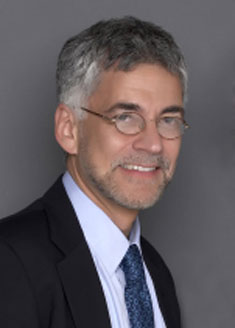A Weighty Cultural Change
Massachusetts is leading the way in fighting the public health challenge of obesity, Friedman School Symposium is told
By Jacqueline Mitchell

“The data and evidence indicated this health issue was a top priority,” said John Auerbach.
“Data matters,” said John Auerbach, commissioner of the Massachusetts Department of Public Health since 2007. When he looked at the “dramatically troubling” numbers—more than half the state’s adults are overweight, as are more than a third of its schoolchildren, and diabetes has doubled over the last decade—it became clear that the department needed to respond to the emerging public health issue of obesity.
“This is a relatively new problem resulting from a number of changes over the last 30 years,” Auerbach said. “What’s changed and how can we have an impact?”
Launched in January 2009, the resulting Mass in Motion program is a statewide, low-cost approach to battling obesity. Auerbach presented the plan in his keynote address at the fourth annual Friedman School Symposium, a meeting for national and international experts to discuss subjects affecting nutrition policy and the food industry.
Some of the Mass in Motion work takes place behind the scenes. For example, when the food-service contract for the four hospitals run by the public health department came due, Auerbach intervened, negotiating healthier menu options for the same price. The strategy worked so well that Massachusetts Gov. Deval L. Patrick signed an executive order requiring similar strict nutritional guidelines for all food-service contracts with state residential facilities. The contracts mandate serving foods with less fat and more fresh fruits and vegetables from local growers when possible.
And starting next year, Massachusetts will require almost 6,000 chain restaurants to post the calorie counts for each menu item. The new rule is based on similar regulations passed in New York City in 2008. Evidence already shows that Big Apple diners are opting for the lower-calorie choices, and the restaurants are, in turn, amending their menus. “Once people had the information, they stopped ordering certain things,” said Auerbach.
In another measure, the Massachusetts health department requires that public schools perform body mass index (BMI) screenings on all children and provide that information confidentially to parents.
Passing regulations like these is a fast and inexpensive way to get things done, Auerbach said. It also attracts much-needed media attention to the obesity epidemic. But regulations are not enough. Public health officials must work to “change the culture around overweight and obesity,” he added. Mass in Motion includes a public information campaign with advertising on buses, trains and billboards, and an interactive website that offers health and diet information as well as tools to help people set and achieve fitness goals.
Likewise, the state’s Workplace Wellness Initiative provides small grants to employers to implement exercise programs during the work day. Today, 20,000 Massachusetts workers participate in lunchtime yoga or dance sessions or afternoon walks with their colleagues. “Employers got into it thinking it would boost productivity or lower health-care costs, but it became clear that the primary benefit was to company morale,” said Auerbach.
Mass in Motion also partners with cities and towns willing to support residents’ health and fitness through “all aspects of policy.” Through programs like Tufts’ own Shape Up Somerville, municipalities can apply for small grants to educate school kids and parents about better nutrition, change zoning laws to bring supermarkets to depressed neighborhoods or build playgrounds and bike paths.
“It’s nice to see the underlying science linked to action,” Eileen Kennedy, dean of the Friedman School of Nutrition Science and Policy, said at the symposium.
“The data and evidence indicated this health issue was a top priority,” Auerbach said. “We have to make this work. I think we’re going in the right direction.”
Jacqueline Mitchell can be reached at jacqueline.mitchell@tufts.edu.

